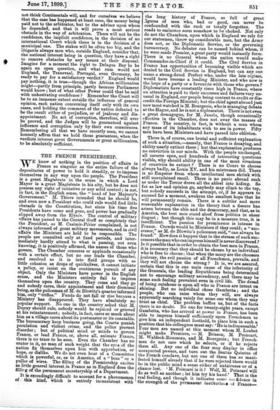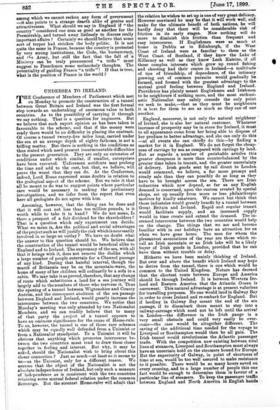THE FRENCH PREMIERSHIP.
WE know of nothing in the position of affairs in France so singular as the entire failure of the depositaries of power to hold it steadily, or to impress themselves in any way upon the people. The President is a great Magistrate in the sense in which a Lord Mayor is a great Magistrate in his city, but he does not possess any right of initiative or any solid control ; is not, in fact, in the English sense, the " head of her Majesty's Government." M. Thiers intended that he should be, and even now a President who could rule would find little obstacle in the Constitution, but since his time five Presidents have come and gone, and power has gradually slipped away from the Elysee. The control of military affairs has passed to the Central Staff so completely that the President, as M. Casimir-Perier complained, is not always informed of great military movements, and in civil affairs the Ministers are held to be responsible. The people are consulted only at fixed periods, and inter- mediately hardly attend to what is passing, not even knowing, it is positively affirmed, the names of those who govern. The Chamber censures or applauds occasionally with a certain effect, but no one leads the Chamber, and resolved as it is into fluid groups with as little cohesion as drops of quicksilver, it cannot initiate a policy, or insist on the continuous pursuit of any object. Only the Ministers have power in the English sense, and the Ministers entirely fail to impress themselves upon the country. They come and they go and nobody cares, their appointment and their dismissal being, as the policeman of M. de Blowitz's quarter informed him, only "trifles." Funds do not fall or rise because a Ministry has disappeared. Tbey have absolutely no popular support. No one in the country asked that M. Dupuy should rule, nobody would be rejoiced or grieved at his reinstatement; nobody, in fact, cares so much about him as a village cares about its postmaster or its constable. The bureaucracy keep business going, the Courts punish peculation and violent crime, and the police prevent disorder ; but of political mind or minds to govern France, or lead France, or, above all, animate France, there is no trace to be seen. Even the Chamber has no orator in it, no man of such weight that the eyes of the nation fix themselves upon him with approbation, or hope, or dislike. We do not even hear of a Committee which is powerful, or, as in America. of a " boss " or a puller of wires. The filling of the Premiership excites as little general interest in France as in England does the fillirg of the permanent secretaryship of a Department.
It is exceedingly difficult to account for a phenomenon of this kind, which is entirely inconsistent with the long history of France, so full of great 3gures of men who, bad or good, can never be confounded with the ruck or totally forgotten. The roads to eminence seem somehow to he choked. Not only do not the Chambers, upon which in England we rely for our statesmen, throw up considerable men, but the Army does not, or the Diplomatic Service, or the governing bureaucracy. No debater can be named behind whom, it he were made Premier, a great party would instantly form. There is no General whom the nation would make Commander-in-Chief if it could. The Civil Service in France has opportunities of becoming visible which are denied to the Civil Service in England, but can any one name a strong-fisted Prefect who, under the late regime, would have become a leading Minister, and who now is the hope of a party or a favourite with those who govern ? Diplomatists have constantly risen high in France, where an attention is paid to their successes and failures very un- usual in England, our people being content to credit or dis- credit the Foreign Minister; but the chief agent abroad just now most watched is M. Bourgeois, who is managing debate at the Hague, and he is not a diplomatist. There is not even a great demagogue, for M. Jauri:s, though occasionally effective in the Chamber, does not sway the masses of France. The country, in fact, is without a man whom any mass of its inhabitants wish to see in power. Fifty men have been Ministers and have passed into oblivion.
There is, of course, one brutal and sufficient explanation of such a situation,—namely, that France is decaying, and ability nearly extinct there ; but that explanation produces no conviction in our minds. With the people unchanged, all careers open, and hundreds of interesting questions visible, why should ability in one of the most vivacious of countries be extinct ? There is no Court to choose always badly, as Louis XV. and his mistresses did. There is no Emperor from whom intellectual men shrink with still unexplained recoil. There is no panic abroad such as under the Terror drove all the ablest into hiding. So far as law and opinion go, anybody may climb to the top, but nobody succeeds in the attempt, or, if he appears to succeed for a moment, awakens the smallest hope that he will permanently remain. There is a, subtler and more reasonable explanation in the theory that a fissure has arisen between the able and the democracy, and that, as in America, the best men stand aloof from politics in sheer disgust ; but though this may be in a measure true, it is insufficient. The passion for prominence is intense in France. Crowds would be Ministers if they could; a " suc- cessor," as M. de Blowitz's policeman said, " can always be found." How does it happen that in the stream of such suc- cessors the man who can impress himself is never discovered ? Is it possible that in order to obtain the best men in France, it is necessary that they should be chosen by an individual who is free to choose; that when the many are the choosers jealousy, the evil passion of all Frenchmen, prevails, and they will not choose the strong ? It is, we are assured, certain that this is one main cause of the inferiority of the Generals, the leading Republicans being determined not to encourage military ascendency, and there may be some such feeling prevalent even in civil life. The dread of being outshone is upon all who in France are intent on shining. But no individual chose Gainbetta ; and the people, who can raise whom they will, are always apparently searching vainly for some one whom they may trust as chief. The problem baffles us, but of the facts there is no doubt. No one for twenty-eight years, except Garabetta, who has arrived at power in France, has been able to impress himself sufficiently upon Frenchmen to give him an independent foothold, to place him in such a position that his colleagues must say: 'He is indispensable.' Four men are named at this moment whom M. Loubet might make Premiers, — M. Brisson, M. Poincard, M. Waldeck-Rousseau, and M. Bourgeois ; but French- men do not care which he selects, or if he rejects them all. Any one of the four may display in office unexpected powers, and turn out the &luaus Quintus of the French conclave, but not one of them has so mani- fested himself already that if he were rejected there would be in the public mind a sense either of unfairness or of a chance lost. M. Poinca,re is it ? Well, 31. Poincar6 will do as well as another ; let him try his hand.' That is the real feeling, and though it indicates some cuildence in the strength of the permanent institutious of France-- among which we cannot reckon any form of government —it also points to a strange dearth alike of genius and attractiveness. What should we say in England if "the country" considered one man as good as another for the Premiership, and turned away listlessly to discuss really important affairs ? Certainly we should believe that some sort of torpor had stricken the body politic. It is not quite the same in France, because the country is protected by very strong institutions, the Code, the bureaucracy, and the Army, but •still the fact that the fall of a Ministry can be truly pronounced "a trifle" must suggest to Frenchmen some melancholy thoughts. The potentiality of guiding France "a trifle" ! If that is true, what is the position of France in the world ?







































 Previous page
Previous page